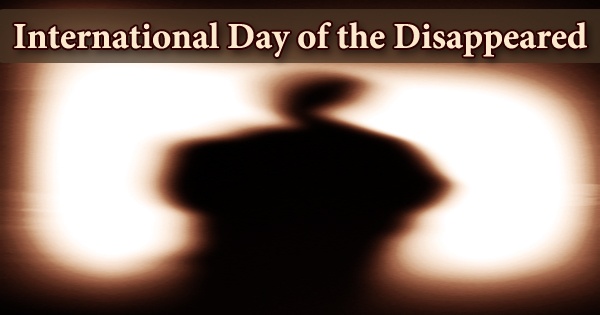When people go missing without any information regarding their whereabouts, this is known as an enforced disappearance. They are frequently imprisoned without charge or trial, and their bodies are sometimes murdered and buried. Every year on August 30th, the “International Day of the Disappeared” is commemorated to raise awareness about the plight of those who are imprisoned in places and under conditions that are unknown to their relatives and/or legal representatives. The Latin American Federation of Associations for Relatives of Detained-Disappeared (Federación Latinoamericana de Asociaciones de Familiares de Detenidos-Desaparecidos, or FEDEFAM), a non-governmental organization founded in 1981 in Costa Rica as an association of local and regional groups actively working against secret imprisonment, forced disappearances, and abduction in a number of Latin-American countries, provided the impetus for the day. Enforced disappearance has evolved into a global issue that is not limited to a single location. Enforced disappearances, which were once primarily the province of military dictatorships, can now be carried out in complicated conditions of internal conflict, particularly as a tool of political repression of opponents. On the International Day of Disappeared, the delegation of the International Committee of the Red Cross (ICRC), the International Commission on Missing Persons (ICMP) and the Missing Persons Institute (MPI) of Bosnia and Herzegovina wish to highlight those thousands of persons remain unaccounted for in Bosnia and Herzegovina. An estimated 13,000 of the more than 30,000 people who went missing at the end of the battle are still missing. Their families remain in a state of fear and grief, waiting for word on the fate of their lost relatives. A number of international bodies and organizations involved in human rights activism and humanitarian aid, such as Amnesty International (AI), the Office of the United Nations High Commissioner for Human Rights (OHCHR), and the International Committee of the Red Cross (ICRC), work on secret imprisonment. The International Day of the Disappeared provides a platform to publicize the work of these organizations, raise public awareness, and solicit funds and volunteers. Because of its unique status as a non-governmental sovereign body with a strict neutrality policy, the ICRC enjoys significant benefits. The ICRC is sometimes the only institution allowed access to specific groups of prisoners, allowing for a minimum level of contact and observation of their treatment. For impacted relatives, the ICRC’s notes are frequently the only source of information concerning the fate of these detainees. The ICRC’s mandate includes visiting persons jailed as a result of hostilities and assisting them in reestablishing and maintaining touch with their families.
However, the notion of the Missing or Disappeared extends far beyond those who have been compelled to disappear. It encompasses everyone who has lost contact with their family as a result of conflicts, natural catastrophes, or other tragedies. Enforced disappearances are most often the result of dictatorships or criminal regimes like ISIS, but they can also affect vulnerable people like refugees, those living in conflict zones, and journalists. They can even occur in democratic countries on rare occasions. These people could be arrested, trapped in another country, hospitalized, or deceased. The ICRC seeks information on their fate on behalf of their families through its tracing services and collaboration with the 189 national Red Cross and Red Crescent Societies throughout the world. It reminds governments and other organizations of their responsibilities to protect the right of families to know what happened to their loved ones. It also works with families of the missing to help them address their particular psychological, social legal and financial needs. The annual commemoration of the International Day of the Disappeared aims to bring attention to those who have been imprisoned without their friends or relatives knowing where they are or why they have been imprisoned; it also highlights the work of organizations that campaign against secret imprisonment and support the “disappeared” and their families. On this day, families of the “disappeared” hold events around the world to raise awareness. Families and friends of the victims suffer from gradual mental torment as they wait to learn whether the victim is still alive and, if so, where he or she is being held, under what conditions, and in what condition of health. They fluctuate between optimism and sorrow, wondering and waiting for news that may never come, sometimes for years. Furthermore, they are well aware that they, too, are under threat, that they may face the same destiny, and that seeking the truth may put them in much more danger. The ICRC’s involvement in the initiation and creation of the Law on Missing Persons, its data base of missing persons and ante-mortem data, which are used by authorities and experts in identifying mortal remains, as well as its participation in all national and regional coordination aimed at clarifying the fate of the missing, have demonstrated the ICRC’s unwavering commitment to the tracing process of the missing. In various interpretations of human rights, as well as, in the case of an armed conflict, International Humanitarian Law, imprisonment in secret or unclear conditions constitutes a grave breach. The General Assembly of the United Nations adopted a Declaration on the Protection of all Persons from Enforced Disappearance as resolution 47/133 on December 18, 1992. Secret detention is thought to be practiced in roughly 30 nations. Victims of enforced disappearance are devoid of all rights and are at the mercy of their captors after being removed from the protective sphere of the law and “disappeared” from society. On the International Day of the Disappeared, August 30, 2007, hundreds of Filipino relatives and supporters of desaparecidos, usually activists, who went missing after being abducted or slain by Philippine security agents, demonstrated against the government. The day is set aside to raise awareness of people who have vanished around the world. Many people participate in protests, urging their local governments and communities to do more to address the issue. The ICRC and ICMP, as well as MPI administration, are hoping that their collaborative efforts will continue to grow within the Missing Persons Institute, speeding up the entire process.
















